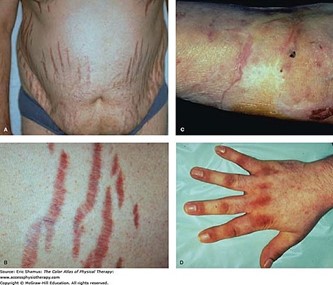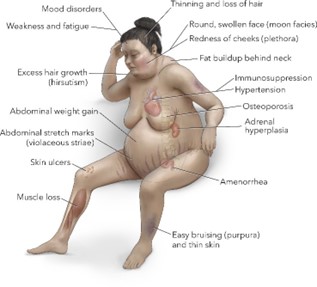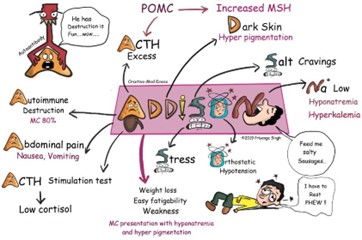A nursing assessment of a patient with Cushing syndrome reveals that the patient has truncal obesity and thin and legs. An additional manifestation of Cushing syndrome that the nurse would expect to find is:
decreased axillary and pubic hair.
chronically low blood pressure,
bronzed appearance of the skin.
purplish red streaks on the abdomen.
The Correct Answer is D
Cushing syndrome is a hormonal disorder caused by prolonged exposure to high levels of cortisol hormone in the body. It can cause a variety of physical manifestations, including truncal obesity, thin arms, and legs, decreased axillary and pubic hair, hypertension, glucose intolerance, osteoporosis, and purple striae (stretch marks) on the abdomen.
Out of the options given, the nurse would expect to find purplish-red streaks on the abdomen as an additional manifestation of Cushing syndrome.


Nursing Test Bank
Naxlex Comprehensive Predictor Exams
Related Questions
Correct Answer is A
Explanation
The nurse will include the instruction "Offer the client the commode or urinal every 2 hours" in the teaching plan for the client's family. This approach is known as timed voiding and can help the client re-establish a regular pattern of urination. Option "a" promotes frequent voiding, which helps
prevent accidents and promotes bladder health. Option "b" is not a recommended approach and can lead to dehydration, urinary tract infections, and other complications. Option "c" is also not recommended since holding urine for extended periods can lead to bladder distention and increase the risk of urinary tract infections. Option "d" is also not recommended since catheterization should only be considered in specific cases where other options have failed or are not feasible.
Correct Answer is D
Explanation
One of the hallmarks of adrenal insufficiency is dehydration and decreased urinary output, which can lead to electrolyte imbalances such as hyperkalemia and hyponatremia. As treatment begins to take effect, the patient's fluid and electrolyte balance should improve, leading to an increase in urinary output. Acute adrenal insufficiency, also known as the Addisonian crisis, is a life-threatening condition caused by a sudden decrease in cortisol and aldosterone hormones. Treatment usually involves the administration of intravenous glucocorticoids and mineralocorticoids to replace the deficient hormones.
Decreasing serum sodium (a) and decreasing blood glucose (b) are not signs of improvement but rather indicative of continued adrenal insufficiency. Decreasing serum potassium (c) is also not a sign of improvement as it could indicate that the patient is developing hyperkalemia, which is a potential complication of adrenal crisis.

Whether you are a student looking to ace your exams or a practicing nurse seeking to enhance your expertise , our nursing education contents will empower you with the confidence and competence to make a difference in the lives of patients and become a respected leader in the healthcare field.
Visit Naxlex, invest in your future and unlock endless possibilities with our unparalleled nursing education contents today
Report Wrong Answer on the Current Question
Do you disagree with the answer? If yes, what is your expected answer? Explain.
Kindly be descriptive with the issue you are facing.

